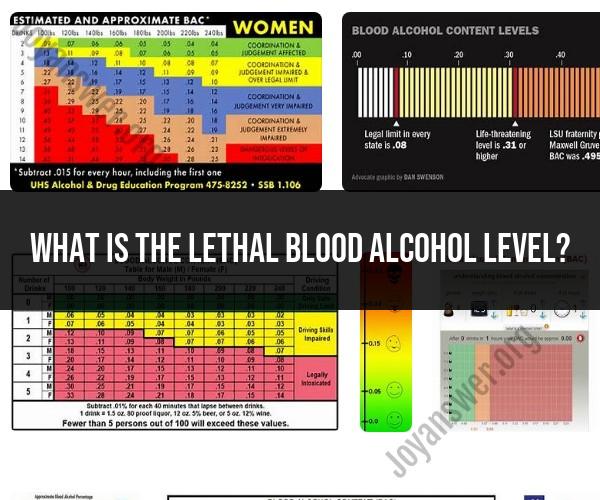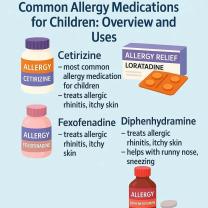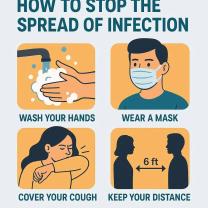What is the lethal blood alcohol level?
The lethal blood alcohol level can vary significantly from person to person due to factors such as tolerance, body weight, age, and individual differences in metabolism. Additionally, it's essential to note that alcohol poisoning and its potential lethality are not solely determined by the blood alcohol concentration (BAC) but also by the rate at which alcohol is consumed and the person's overall health.
That said, there is a general guideline for understanding lethal blood alcohol levels:
BAC Below 0.08%: Most people begin to experience impairment in coordination, judgment, and reaction time as their BAC rises. At this level or lower, it is unlikely that alcohol alone will be lethal for most individuals. However, it can impair driving abilities and increase the risk of accidents.
BAC Between 0.08% and 0.3%: In this range, people can experience severe impairment of motor skills, slurred speech, memory lapses, and impaired judgment. It is still uncommon for death to occur solely from alcohol poisoning within this range, but it can happen, particularly if the person has a low tolerance or other health issues.
BAC Between 0.3% and 0.4%: This is a dangerous level of alcohol intoxication. It can lead to severe impairment of vital functions, including breathing, heart rate, and body temperature. It's possible for alcohol poisoning and death to occur in this range, especially if the person has a low tolerance or pre-existing health conditions.
BAC Above 0.4%: At this point, alcohol poisoning becomes highly likely, and the risk of death significantly increases. The person may experience unconsciousness, respiratory depression, and the inability to regulate body temperature. Medical intervention is critical to prevent a potentially fatal outcome.
BAC Above 0.4% and 0.5% or Higher: Extremely high BAC levels are life-threatening. The person is at a significant risk of respiratory failure, cardiac arrest, coma, and death. Immediate medical attention is essential to prevent a fatal outcome.
It's important to remember that BAC can vary based on factors such as sex, body weight, genetics, and tolerance to alcohol. What may be a lethal BAC for one person may not be for another. Additionally, the rate of alcohol consumption and whether other substances, such as drugs or medications, are involved can further complicate the situation.
If you suspect someone has alcohol poisoning or is experiencing severe alcohol intoxication, it's crucial to seek medical help immediately. Alcohol poisoning is a medical emergency, and timely intervention can be lifesaving. Never hesitate to call 911 or take the person to the nearest emergency room if you suspect alcohol poisoning.
Lethal Blood Alcohol Levels: The Dangers of Excessive Drinking
A lethal blood alcohol level (BAC) is the amount of alcohol in the blood that is likely to be fatal. This level varies from person to person, but it is generally considered to be between 0.40% and 0.50%.
When BAC reaches these levels, the body's vital functions begin to slow down and eventually stop. This can lead to coma and death.
Alcohol Poisoning and Lethal BAC: Recognizing the Risks
Alcohol poisoning is a serious medical condition that can occur when a person drinks too much alcohol too quickly. Symptoms of alcohol poisoning include:
- Confusion
- Drowsiness
- Vomiting
- Seizures
- Loss of consciousness
- Coma
If you suspect that someone is experiencing alcohol poisoning, it is important to call 911 immediately. Alcohol poisoning can be fatal if it is not treated promptly.
The Thin Line: Understanding the Lethal Blood Alcohol Level
The lethal BAC is a dangerous level that can quickly lead to death. It is important to remember that there is no safe level of alcohol consumption. Even moderate drinking can have negative consequences for your health.
If you are concerned about your drinking habits, talk to your doctor. They can help you to develop a plan to reduce your drinking or to quit altogether.
Here are some additional tips for reducing your risk of alcohol poisoning and death:
- Drink slowly and pace yourself.
- Alternate alcoholic drinks with non-alcoholic drinks.
- Eat a meal before drinking alcohol.
- Avoid drinking alcohol on an empty stomach.
- Be aware of your tolerance and don't drink more than you can handle.
- If you feel drunk, stop drinking.
- Never drink and drive.
If you are concerned about someone else's drinking habits, talk to them about your concerns. Offer to help them get help if they need it.













